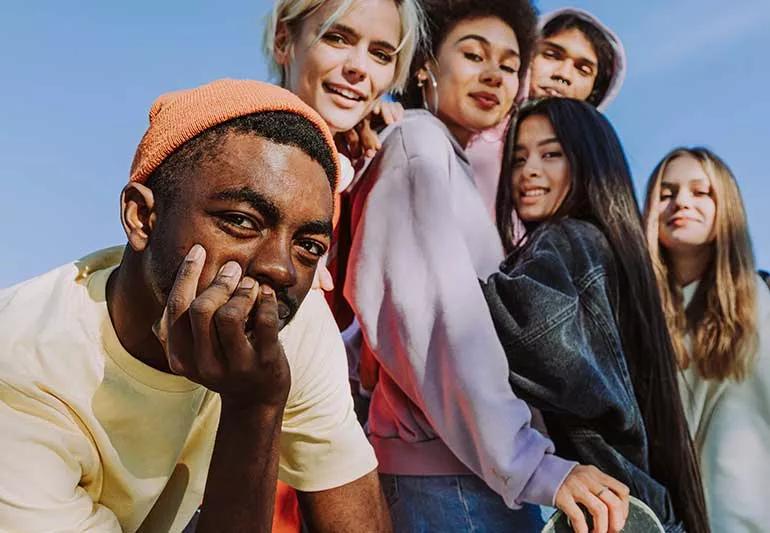The answer is ‘yes,’ with a noticeable trend toward healthier living — but there’s a caveat

Image content: This image is available to view online.
View image online (https://assets.clevelandclinic.org/transform/25ddd04f-0cf0-4ad0-9567-ee74cd109135/Gen-Z-Drinking-Less-1363627613-770x533-1_jpg)
group of Gen Z friends
College-aged kids carry a certain reputation when it comes to drinking alcohol. It’s a vision shaped by the rowdy Delta frat in “Animal House,” the OG when it comes to the party-hard film genre.
Advertisement
Cleveland Clinic is a non-profit academic medical center. Advertising on our site helps support our mission. We do not endorse non-Cleveland Clinic products or services. Policy
That idea, however, may be as dated as that classic movie. Research shows that the Generation Z crowd now on campus seems to be knocking back far less beer and booze than previous generations.
And this isn’t just a random blip in the numbers: “Younger adults are drinking less alcohol — and it has been moving in that direction for two decades,” says addiction psychiatrist Akhil Anand, MD.
So, what’s behind the trend? And does this mean alcohol and drug use worries are disappearing for Gen Z, loosely defined as those born between 1997 and 2010? Let’s take a closer look with Dr. Anand.
Video content: This video is available to watch online.
View video online (https://www.youtube.com/embed/arLlGcN0uO4?si=dR113mNLBq3dhmPy)
Want a beer? The answer to that question is increasingly “no” for college students and young adults (age 18 to 22) not in school. A study published in 2020 found that alcohol abstinence is increasingly common among Gen Z.
Researchers found that:
How noticeable is the trend? Put it this way: Earlier this year, music venues holding concerts catering to Gen Z reported significant drops in alcohol sales during the events. (The bar tab is still strong at shows attended by older fans, by the way.)
Advertisement
Is there a definitive reason for Gen Z’s movement away from alcohol? “The answer is we don’t really know,” says Dr. Anand. “But there are a lot of theories.”
So, let’s look at a few of them. (SPOILER ALERT: They’re not all positive signs.)
Years ago, people routinely turned to alcohol instead of each other to cope with the stresses of life. It’s why “drowning one’s sorrows” became a well-known phrase.
But in today’s world, people talk far more openly about depression, anxiety and other mental health issues, explains Dr. Anand. There’s an understanding that these feelings are part of the human condition— and that alcohol isn’t a solution.
“Alcohol is a depressant and never the answer to a bad day,” says Dr. Anand. “Gen Z seems to understand that concept and they’ve moved in a different direction.”
The “clean living” lifestyle embraced by many in Gen Z means making healthier choices when it comes to eating and drinking. It’s one of the forces driving increases in organic food sales and products such as kombucha.
Alcohol is a toxin that doesn’t exactly fit within that care-for-your-body mindset, notes Dr. Anand. (The increased popularity of “Dry January” — where people commit to not drink for the month — is another example of thought process in action.)
Giving up alcohol also can lead to health benefits such as:
“When people give up drinking, even for a month, they often notice that they feel better,” notes Dr. Anand. “That’s not by coincidence.
Numerous programs aimed at school-aged children warn about the dangers of alcohol use. “The message may be getting through,” suggests Dr. Anand.
In ditching alcohol, did members of Gen Z just replace one drug with another? The answer might be yes judging by the research.
Decreases in alcohol consumption by Gen Z coincide with an uptick in cannabis use, according to numerous reports. The rise coincides with increased legalization of cannabis and a lower feeling of risk, says Dr. Anand.
Is this a one-for-one trade in substances? Some signs point that way. “There are people using cannabis to cope with stress and depression, just like they were using alcohol,” he explains. “We see similar harmful use patterns.”
While some Gen Zers have turned away from alcohol, many of their peers continue to binge drink beer, wine and liquor. (Binge drinking is defined as five or more drinks for men and four or more drinks for women on a single occasion.)
Advertisement
“Binge drinking is highest among younger adults — and it can be very harmful,” states Dr. Anand. “We’re even seeing a rise in severe liver disease in younger people from drinking too much alcohol.”
Are there positive signs involving trends with drinking and alcohol use disorder? Absolutely, says Dr. Anand. But that movement doesn’t erase the reality that addiction remains a significant health issue.
Increased use of cannabis and other drugs also deserves greater attention.
“There’s a new landscape of drug use with young adults,” he continues. “It’s nice to see that there is more awareness about alcohol use, but we’re still seeing extremes with alcohol and other substances.
“If you or someone you know is struggling with addiction, know that there is help available. Go to your healthcare provider, family or friends. Nobody needs to go at it alone.”
Advertisement

Delivered every Tuesday!
Sign up for our Health Essentials emails for expert guidance on nutrition, fitness, sleep, skin care and more.
Learn more about our editorial process.
Advertisement
No alcohol is actually ‘healthy,’ but some drinks may be less harmful than others
All the taste, none of the alcohol
Drinking during the day can result in drinking more than usual and worsen your sleep cycle
Blood glucose monitoring and drinking in moderation can help you avoid hypoglycemia
Excess alcohol and substance use can cause temporary and permanent memory loss
Legality, toxicity and effectiveness are all ongoing concerns
Your liver, heart and skin will all thank you for the break from alcohol
Changing habits takes time and commitment
Type 2 diabetes isn’t inevitable with these dietary changes
Applying a hot or cold compress can help with pain
Pump up your iron intake with foods like tuna, tofu and turkey